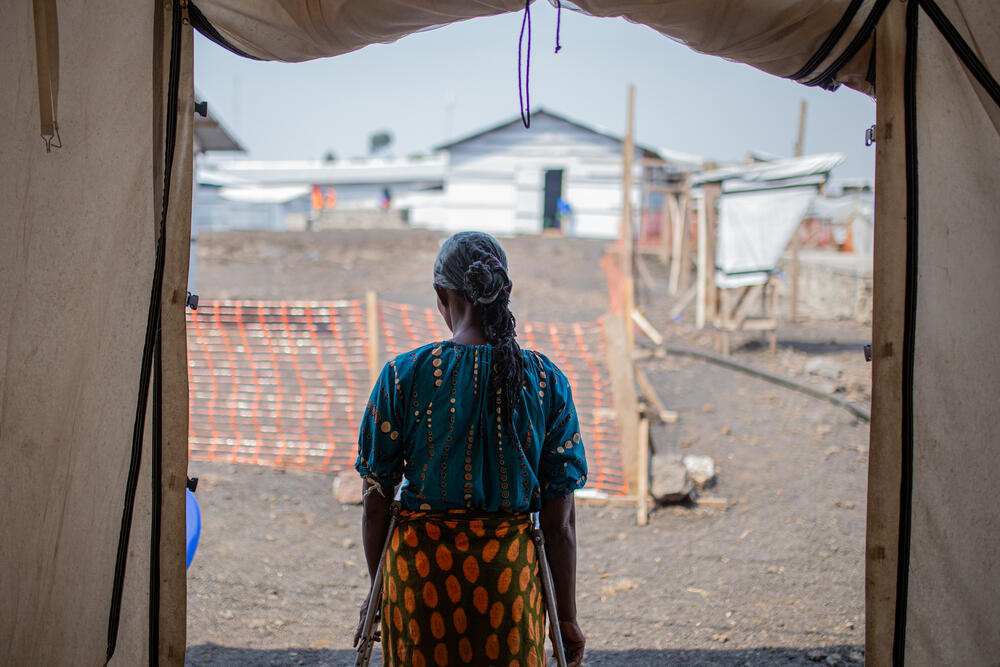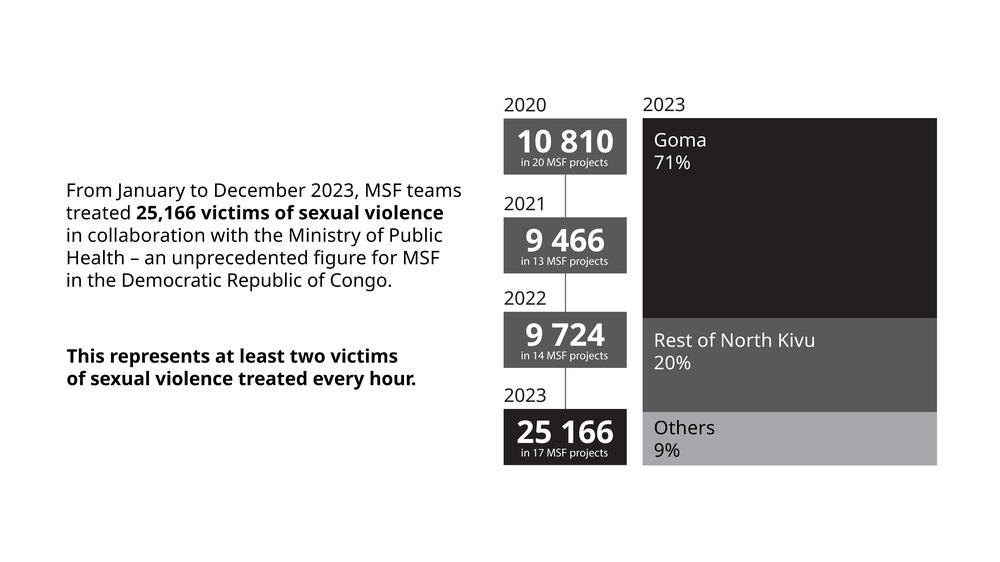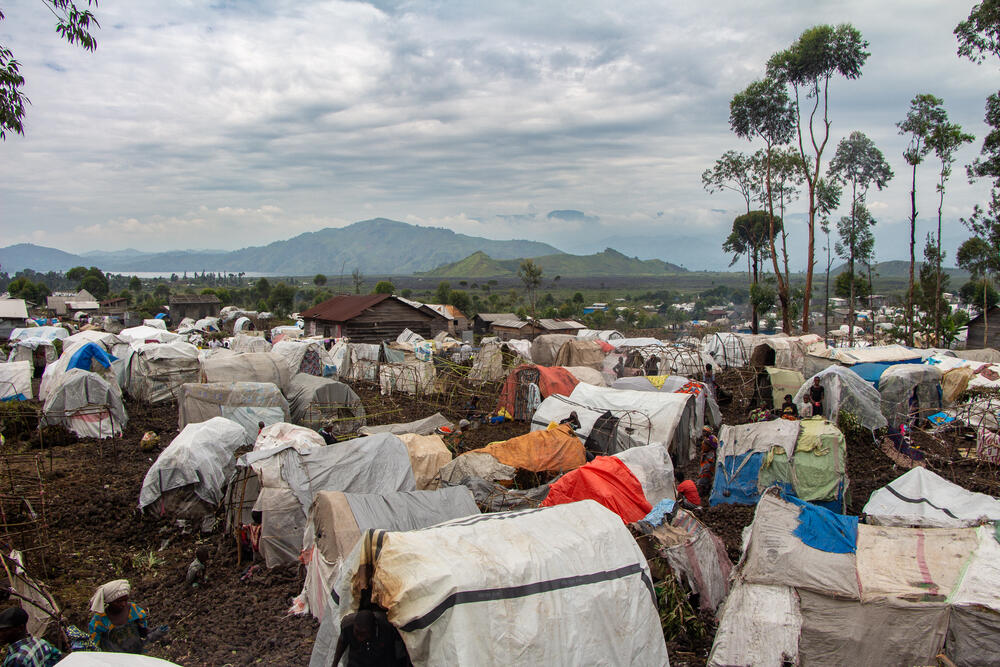DRC: MSF report reveals explosion of sexual violence in 2023
MSF treated an unprecedented number of survivors of sexual violence in the Democratic Republic of Congo (DRC) in 2023, averaging over two every hour. Admissions continued to increase in the first months of 2024.
In 2023, MSF teams in the DRC helped to treat 25,166 survivors of sexual violence across the country. In the previous three years, MSF teams treated an average of 10,000 victims per year in the country.
This figure is by far the highest number ever recorded by MSF in DRC. Data comes from 17 projects set up by MSF in support of the Ministry of Health in five Congolese provinces – North Kivu, South Kivu, Ituri, Maniema and Central Kasai.
This trend accelerated in the first months of 2024: in North Kivu province alone, 17,363 survivors were treated with MSF assistance between January and May.
Not even halfway through the year, this already represented 69 percent of the total number of victims treated in 2023 in the five provinces mentioned above.
The problem in displacement camps
The 2023 data presented in the report We are calling for help shows that 91 percent of victims treated with MSF assistance in the DRC were admitted in the province of North Kivu. Here, clashes between the M23 group, the Congolese army and their respective allies have been raging since late 2021, forcing hundreds of thousands of civilians to flee.
The vast majority of victims (17,829) were treated in the displacement sites around the province’s capital city of Goma.
"According to the testimonies of our patients, two-thirds of them were attacked at gunpoint," said Christopher Mambula, head of MSF's programmes in DRC.
"These attacks took place on the sites themselves, but also in the surrounding area when women and girls – who accounted for 98 percent of the victims treated by MSF in the DRC in 2023 – went out to collect wood or water, or to work in the fields.”
The massive presence of armed men in and around displacement sites explains this explosion of sexual violence. In addition, the inadequacy of the humanitarian response and the inhumane living conditions in these sites fuel the phenomenon.
The lack of food, water and income-generating activities exacerbates the vulnerability of women and girls, who are forced to go to neighbouring hills and fields where there are many armed men. One in ten survivors treated by MSF in 2023 were minors.
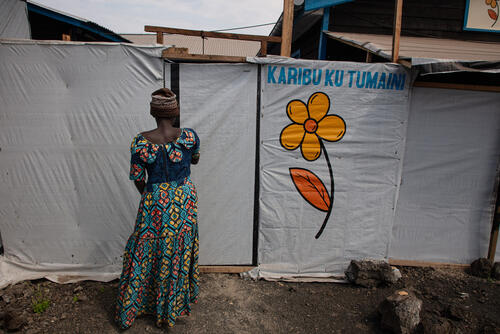
"We are calling for help"
Care for victims of sexual violence in the Democratic Republic of Congo
The lack of sanitation and safe shelter for women and girls leaves them vulnerable to attack. Others are victims of sexual exploitation to support their families.
"On paper, there seem to be many programmes to prevent and respond to the needs of victims of sexual violence. But on the ground in displacement sites, our teams struggle every day to refer victims who need help," said Christopher Mambula.
"The few programmes that do exist are always too short-lived and grossly under-resourced. Much more is needed to protect women and meet the urgent needs of victims.”
Urgent calls for action
The MSF report lists 20 urgent actions to be taken, based on the needs expressed by the survivors, and building on previous work to solve this long-standing problem.
There are three main areas of urgent action:
Firstly, MSF calls on all parties to the conflict to respect international humanitarian law. In particular, we call for the absolute prohibition of acts of sexual violence, as well as respect for the civilian nature of displacement sites. Protecting civilians caught up in the fighting must be a priority.
Secondly, MSF calls for the improvement of living conditions in sites for the internally displaced. Access to essentials like food, water and income-generating activities must be improved, as well as to safe and well-lit sanitation and shelter.
These investments must also be accompanied by increased efforts to raise awareness of sexual violence.
Finally, MSF calls for specific investment in better medical, social, legal and psychological care for victims of sexual violence. This requires long-term funding to improve medical training, the supply of post-rape kits to care facilities, legal support, as well as the provision of shelters for survivors.
Medical care where it's needed most
Help us care for people caught in the world's worst healthcare crises.
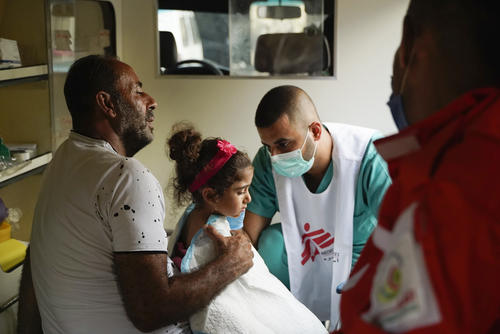
An overwhelming need for medical care
Funding is also needed for awareness-raising activities to prevent stigmatisation or marginalisation of victims, which sometimes prevents them from seeking help. Given the high number of requests for abortion from victims, MSF is also calling for the adaptation of the national legal framework to guarantee access to comprehensive medical abortion care.
Sexual violence is a major medical and humanitarian emergency in the DRC. According to the latest Gender-Based Violence Area of Responsibility (GBV AoR) DRC information, which compiles data from various humanitarian organisations offering gender-based violence care services in 12 provinces of the DRC, 55,500 survivors of sexual violence received medical care in the second quarter of 2024.
MSF in the Democratic Republic of Congo
The second-largest country in Africa by area, the Democratic Republic of Congo (DRC) is riven by conflict. It has endured decades of multiple overlapping crises and severe limitations in medical capacity.
In 2023, as violence escalated in eastern DRC, displacing record numbers of civilians, Médecins Sans Frontières / Doctors Without Borders (MSF) increased activities to respond to the growing humanitarian needs.
In the DRC, MSF continues to run some of its largest programmes, working in 19 of the country’s 26 provinces. We provide services ranging from basic healthcare and nutrition to treatment for victims of sexual violence and people living with HIV/AIDS.
